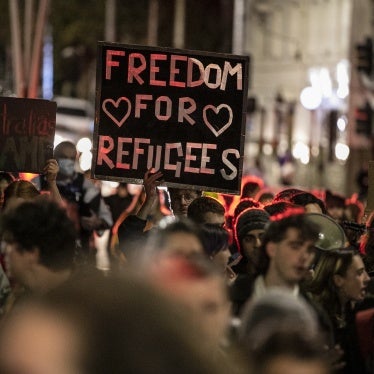After years of seemingly never-ending conflict and repression, Burma's neighbours and the world are watching the changes there with interest and cautious optimism. And for the 140,000 Burma refugees in Thailand, many stuck in camps on the border for decades, there is now some hope that they might be able to go home.
Burma refugees eagerly await the arrival of democracy icon Aung San Suu Kyi at Mae La refugee camp near the Thai-Burma border in June. Human RightsWatch says it is not too late for Thailand to change course and adopt a policy that will support a positive future for the refugees within its territory.
Burma's President Thein Sein last year called for exiles to return as his government and nearly all ethnic armed groups signed preliminary ceasefire agreements. But enormous obstacles remain, including a lack of firm political settlements, landmines and still-blocked access of the UN refugee agency UNHCR to the Burma side of the border.
To its credit, Thailand is still waiting to see how the situation in Burma develops and does not yet appear to be pushing for hasty returns. Now is a good time for Thai officials to think creatively and strategically about how best to prepare refugees for eventual repatriation and reintegration in Burma.
For decades, Thai policy has been to keep refugees idle in nine camps along the Thai-Burma border by restricting their movements and prohibiting them from working. This was a proven recipe for social dysfunction in the camps and has all but ensured that many refugees will be ill-prepared to reintegrate successfully when they do go home.
Most of the camps are in isolated mountain locations, accessible only by dirt roads. Some are overcrowded, and all of the camps have seen cuts in basic assistance, such as food and shelter, from donors who are shifting their attention to programmes inside Burma. The isolation of the camps contributes to an environment ripe for abuse of power and impunity, including by Thai officials who are mandated to protect the refugees.
Many of the better-educated refugees, such as teachers and health workers, have been resettled to countries outside the region, leaving a residual camp population with fewer coping skills. After so many years with restrictions on movement and dependency on outside aid, many camp residents experience domestic abuse, depression and other social and mental health problems.
The government regards refugees who venture out of the camps as illegal aliens, in part because there is no Thai law that gives legal recognition to refugee status. They are subject to arrest on the street, in the workplace and in their homes.
A 33-year-old Karen man living in Mae La camp told Human Rights Watch about his experience when Thai police arrested him: "They asked for money. I said, 'I don't have money'. Then one started to beat me."
Police, soldiers and paramilitaries who apprehend camp residents outside the camps either return them to the camps after exacting bribes or forced labour, or send them to immigration detention centres for deportation to Burma.
Refugees can only work legally in Thailand if they remain silent about their refugee claims and present themselves as migrant workers.
This leaves Burma refugees with a stark and unfair choice: either remain in one of the remote refugee camps and be relatively protected from arrest and deportation, but without freedom to move or work, or leave the camp to live and work, but typically without recognised legal status and at risk of exploitation, arrest and deportation.
Thailand should consider an alternative to its current refugee policy that would provide Burma asylum seekers and all others a fair chance to have their claims for asylum heard. It should also allow refugees to move about and work. Such a policy would contribute to rule of law and reduce opportunities for corruption and exploitation.
As a start, Thailand should work with UNHCR to establish a fair and transparent refugee screening and registration system for unregistered people living in the refugee camps.
The government should engage with refugee leaders, non-governmental organisations, UNHCR and donors for an orderly transition from a closed-camp model to an open-camp model that empowers refugees to become self-sufficient and prepares them to reintegrate successfully in Burma when they are able to repatriate. It is not too late for Thailand to change course and adopt a policy that will support a positive future for the refugees within its territory.
Whatever the longer-term prospects for self-sufficiency or return, the government should immediately ensure that all refugees, including those living in camps, have full access to the Thai justice system and that police and other security officials who abuse their authority by extorting and abusing refugees and migrants will be appropriately disciplined or prosecuted.
A policy that respects the refugees and engages them in decision-making and in developing their skills will not only benefit Thailand in the short term but will also pave the way for voluntary and sustainable repatriation that will engender good will towards Thailand after the refugees go home.







